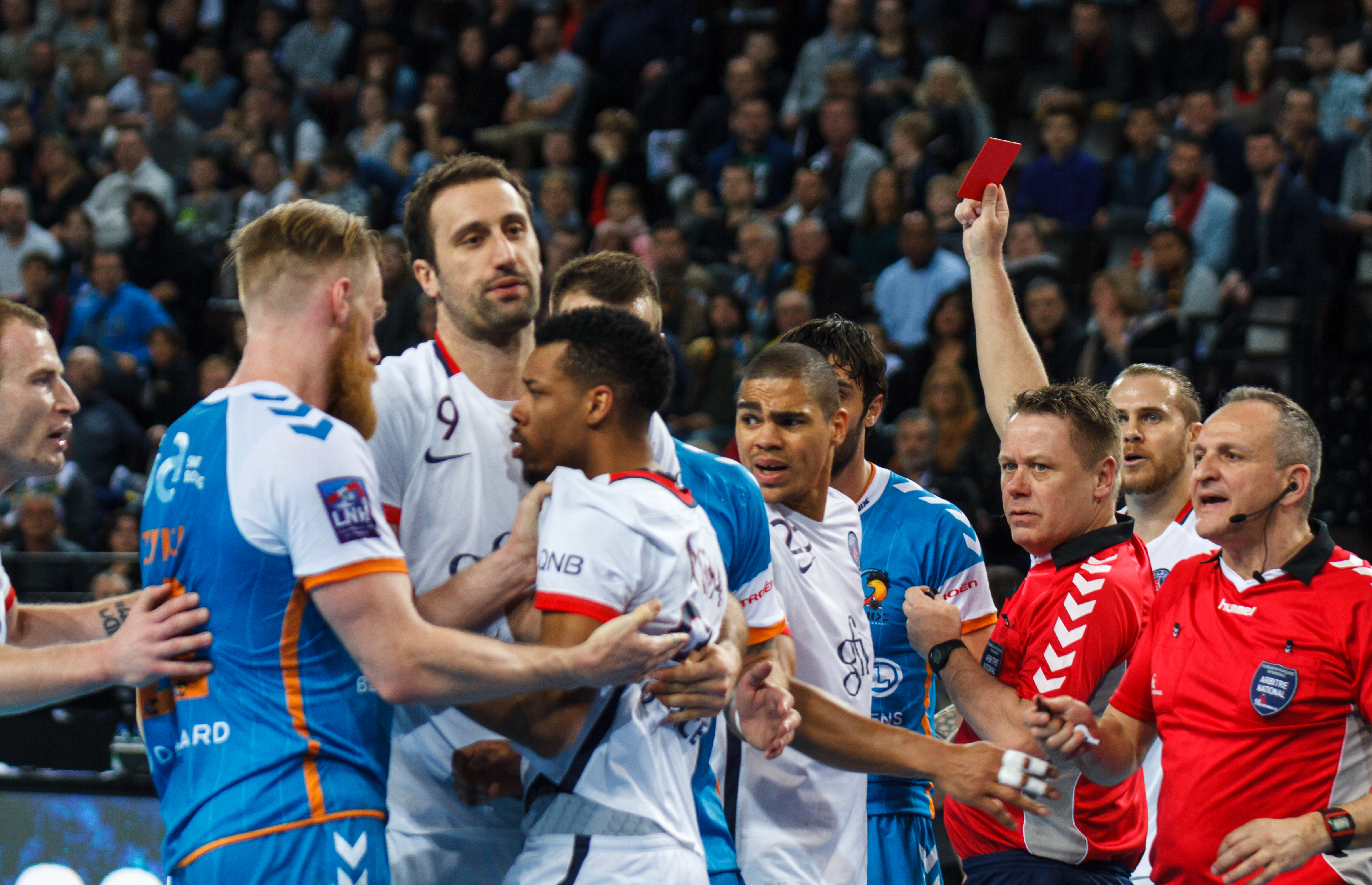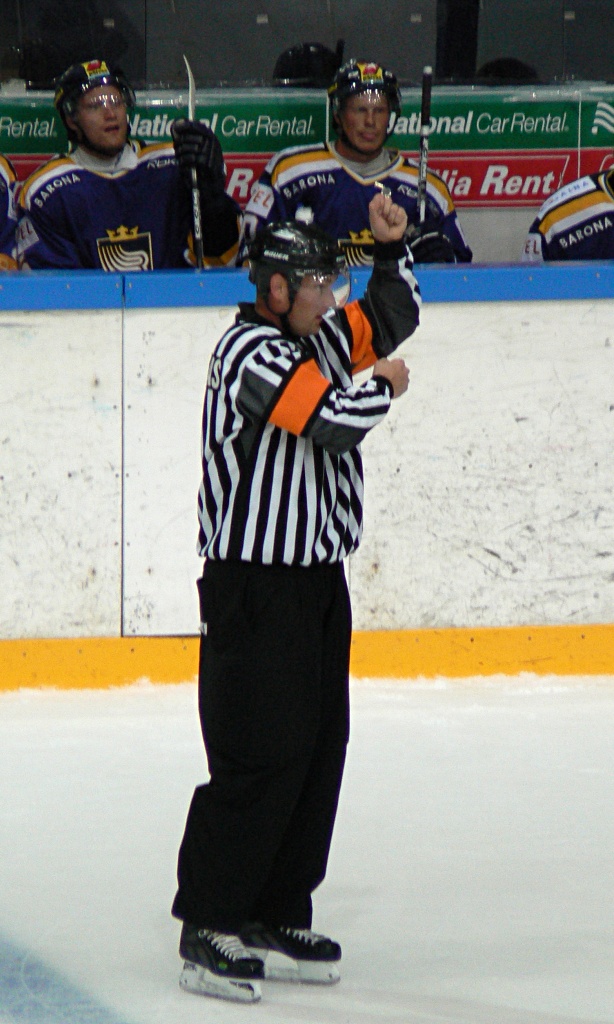|
Match Penalty
Match penalty is a term used in some sports for a player having committed such a serious offense that they are sent off for the rest of the game. The term is used in bandy, floorball, and ice hockey. Bandy In bandy, it is indicated with a red penalty card Penalty cards are used in many sports as a means of warning, reprimanding or penalising a player, coach or team official. Penalty cards are most commonly used by referees or umpires to indicate that a player has committed an offence. The offici .... Ice hockey In ice hockey, there are two kinds of sending-off penalties: " game misconduct penalty" and the more serious or more extreme " match penalty", which is imposed for deliberately injuring or attempting to injure another player. Many other penalties automatically become match penalties if injuries actually occur: under NHL rules, "butt-ending, goalies using blocking glove to the face of another player, head-butting, kicking, punching an unsuspecting player, spearin ... [...More Info...] [...Related Items...] OR: [Wikipedia] [Google] [Baidu] |
Red Card
A red card is a type of penalty card that is shown in many sports after a rules infraction. Red card may also refer to: Art, entertainment, and media * ''Red Card'' (album), 1976 release by Streetwalkers * Red card, suit (cards) of hearts or diamonds * Operation Red Card, 2006 Motion Picture Association anti-piracy drive in Asia * '' RedCard 20-03'', 2002 extreme football video game * Red card trailer Credit cards * American Express Red, credit card * Target REDcard, a credit card issued by Target Corporation Legal * Red card, in capital punishment in Iraq, a legal notice that execution is imminent * Red Card Solution, a guest worker program proposal for immigration to the United States, created by the Vernon K. Krieble Foundation and endorsed by Newt Gingrich in November 2011 Work related * Red card, Industrial Workers of the World membership card * Red card, for wildland fire suppression Wildfire suppression is a range of firefighting tactics used to suppress wildfi ... [...More Info...] [...Related Items...] OR: [Wikipedia] [Google] [Baidu] |
Ejection (sports)
In sports, an ejection (also known as dismissal, sending-off, disqualification, or early shower) is the removal of a participant from a contest due to a violation of the sport's rules. The exact violations that lead to an ejection vary depending upon the sport, but common causes for ejection include unsportsmanlike conduct, violent acts against another participant that are beyond the sport's generally accepted standards for such acts, abuse against officials, violations of the sport's rules that the contest official deems to be egregious, or the use of an illegal substance to better a player's game. Most sports have provisions that allow players to be ejected, and many allow for the ejection of coaches, managers, or other non-playing personnel. In sports that use Penalty card, penalty cards, a red card is often used to signal dismissals. In some sports, another player is permitted to enter the game in place of the player who has been ejected, but in others the team is required to ... [...More Info...] [...Related Items...] OR: [Wikipedia] [Google] [Baidu] |
Bandy
Bandy is a winter sport and ball sport played by two team sport, teams wearing Ice skates#Bandy skates, ice skates on a large ice surface (either indoors or outdoors) while using sticks to direct a ball into the opposing team's goal. The playing surface, called a bandy field or bandy rink, is a sheet of ice which measures by , about the size of a football pitch. The field is considerably larger than the ice rinks commonly used for ice hockey. The sport has a common background with association football, ice hockey, shinty, and field hockey. Bandy's origins are debatable, but its first rules were organized and published in sport in England, England in 1882. Internationally, bandy's strongest nations in both men's and women's competitions have long been Sweden and Russia; both countries have established professional men's bandy leagues. In Russia, it is estimated that more than one million people play bandy. The sport also has organized league play and fans in other countries, in ... [...More Info...] [...Related Items...] OR: [Wikipedia] [Google] [Baidu] |
Floorball
Floorball (also known by other names) is a sport played with five players and a goalkeeper in each team. It is played indoors with sticks and a hollow plastic ball with holes. Matches are played in three periods. The sport of bandy also played a role in the game's development. The game was invented in Sweden in the late 1960s. The basic rules were established in 1979 when the first floorball club in the world, Sala IBK, from Sala, was founded in Sweden. Official rules for matches were first written down in 1981. The sport is organized internationally by the International Floorball Federation (IFF). As of 2019, there were about 377,000 registered floorball players worldwide, up from around 300,000 in 2014. Events include an annual Champions Cup, EuroFloorball Cup and EuroFloorball Challenge for club teams and the biennial World Floorball Championships with separate divisions for men and women. Men's semi-professional club leagues include Finland's F-liiga, Sweden's Sven ... [...More Info...] [...Related Items...] OR: [Wikipedia] [Google] [Baidu] |
Penalty (ice Hockey)
A penalty in ice hockey is a punishment for an infringement of the rules. Most penalties are enforced by sending the offending player to a penalty box for a set number of minutes. During the penalty the player may not participate in play. Penalties are called and enforced by the Official (ice hockey)#Referees, referee, or in some cases, the Official (ice hockey)#Linesmen, linesman. The offending team may not replace the player on the ice (although there are some exceptions, such as fighting), leaving them short handed, short-handed as opposed to full strength. When the opposing team is said to be on a ''Power play (ice hockey), power play'', they will have one more player on the ice than the short-handed team. The short-handed team is said to be "on the penalty kill" until the penalty expires and the penalized player returns to play. While standards vary somewhat between leagues, most leagues recognize several common varieties of penalties, as well as common infractions. The statist ... [...More Info...] [...Related Items...] OR: [Wikipedia] [Google] [Baidu] |
Penalty Card
Penalty cards are used in many sports as a means of warning, reprimanding or penalising a player, coach or team official. Penalty cards are most commonly used by referees or umpires to indicate that a player has committed an offence. The official will hold the card above their head while looking or pointing toward the player who has committed the offence. This action makes the decision clear to all players, as well as spectators and other officials in a manner that is language-neutral. The colour or shape of the card used by the official indicates the type or seriousness of the offence and the level of punishment that is to be applied. Yellow and red cards are the most common, typically indicating, respectively, cautions and dismissals. History and origin The idea of using a universal language – neutral coloured cards to communicate a referee's intentions originated in association football, with English referee Ken Aston. Aston had been appointed to the FIFA Referees' Commit ... [...More Info...] [...Related Items...] OR: [Wikipedia] [Google] [Baidu] |
Penalty (ice Hockey)
A penalty in ice hockey is a punishment for an infringement of the rules. Most penalties are enforced by sending the offending player to a penalty box for a set number of minutes. During the penalty the player may not participate in play. Penalties are called and enforced by the Official (ice hockey)#Referees, referee, or in some cases, the Official (ice hockey)#Linesmen, linesman. The offending team may not replace the player on the ice (although there are some exceptions, such as fighting), leaving them short handed, short-handed as opposed to full strength. When the opposing team is said to be on a ''Power play (ice hockey), power play'', they will have one more player on the ice than the short-handed team. The short-handed team is said to be "on the penalty kill" until the penalty expires and the penalized player returns to play. While standards vary somewhat between leagues, most leagues recognize several common varieties of penalties, as well as common infractions. The statist ... [...More Info...] [...Related Items...] OR: [Wikipedia] [Google] [Baidu] |





